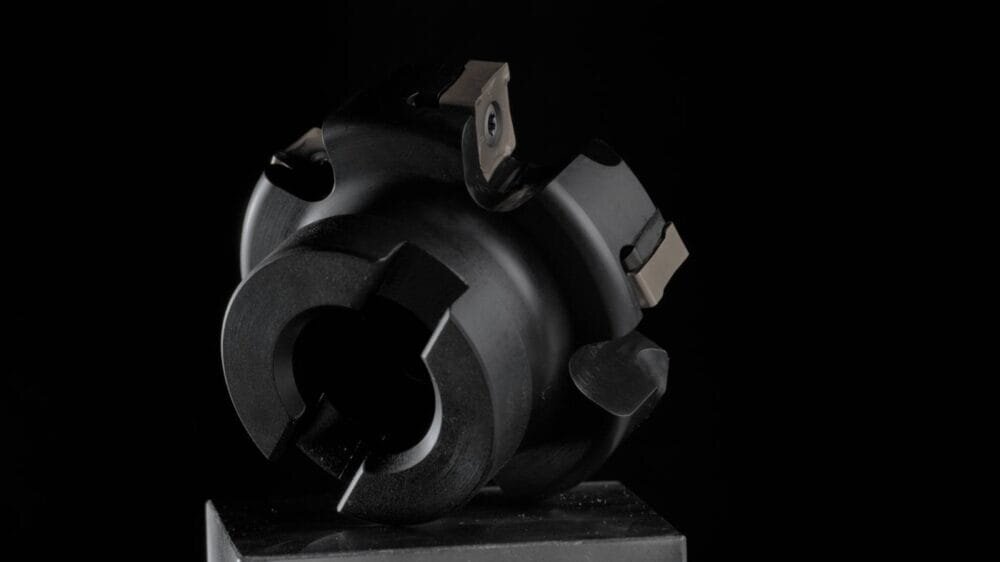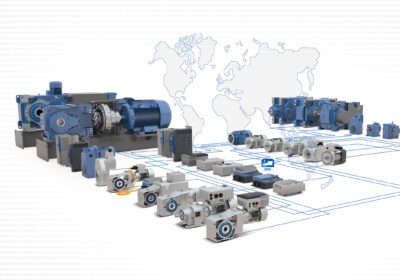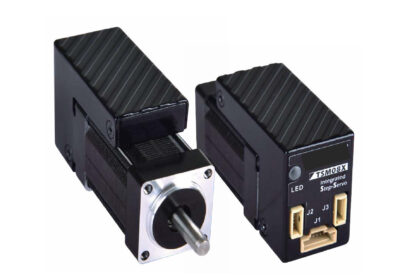CoroMill® MF80 milling concept gives more than 67% increased tool life
In the realm of machining operations, achieving precision and reliability is an ongoing pursuit. Sandvik Coromant, an industry leader, has met this challenge head-on with a tool that promises to revolutionise milling processes. Here, Sangram Dash, Product Application Manager for Indexable Milling at Sandvik Coromant, explains how an innovative concept for milling applications in ISO K and ISO P materials, CoroMill® MF80, supports more precise and cost-effective machining.
Close to 90-degree shoulder milling is highly desirable in machining applications due to its ability to create precise components, which is a necessity as automotive engines grow more complex. Automotive original equipment manufacturers (OEMs) are striving to manufacture parts that comply with tighter tolerances, and in accordance with more intricate and contemporary designs.
These more sophisticated components include engine block transmission cases, gear box housings and steeling knuckles. Due to the intricate shape of these components and the resulting fixturing limitations, a close-to 90 degrees shoulder milling tool is more desirable. That’s because the tool is able to efficiently machine intricate components with low axial loads, which leads to cost savings and increased efficiency in the manufacturing process. A close-to 90 degrees shoulder mill also gives economic benefits.
However, in long overhang applications, shoulder milling often goes hand-in-hand with vibration issues. Tool vibrations in shoulder milling applications can cause detrimental effects such as uneven cutting forces, which result in poor surface finish and reduced accuracy.
Excessive vibrations also accelerate tool wear, diminishing tool life and increasing production costs. Furthermore, they can lead to workpiece inaccuracies and even machine damage. Therefore, minimising tool vibrations is crucial for achieving high-quality and precise shoulder milling operations.
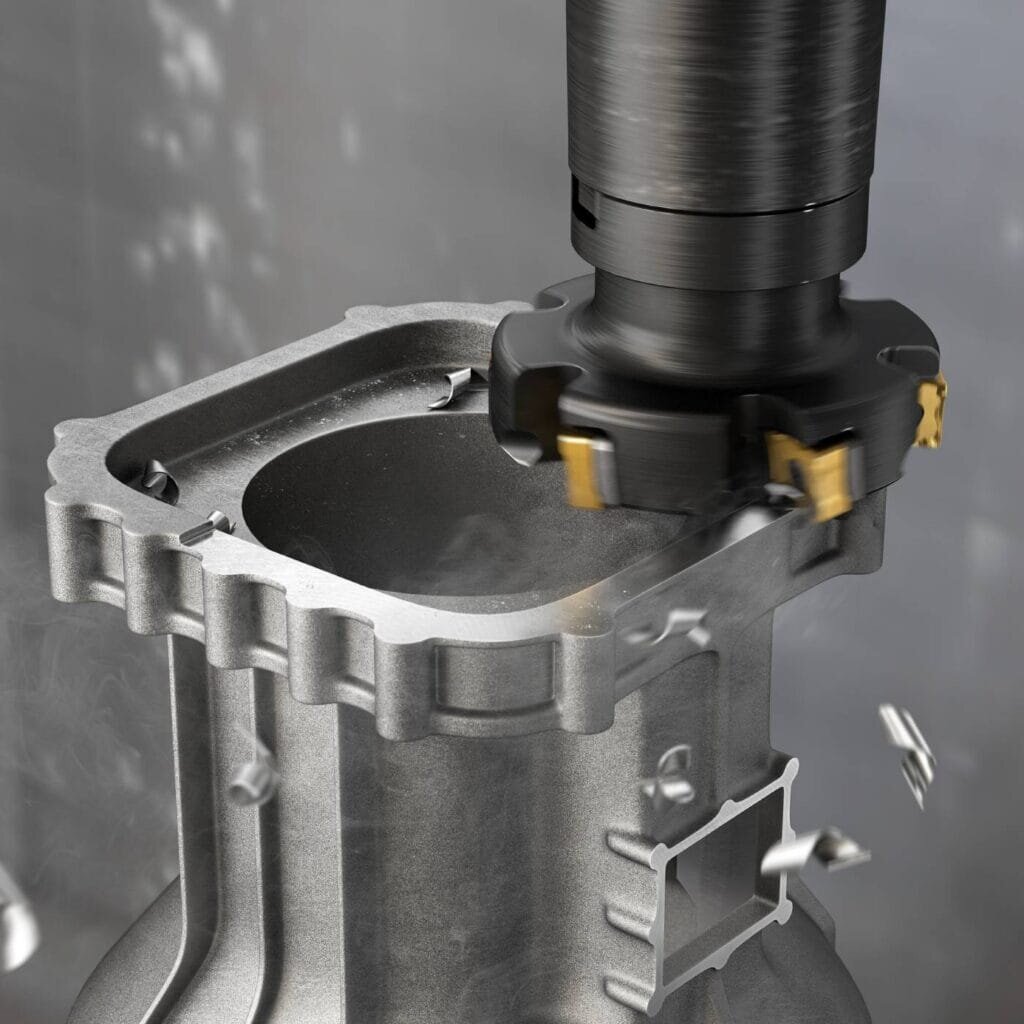
New milling concept
All of these challenges led Sandvik Coromant to develop a milling concept for automotive milling applications in ISO K and ISO P materials. Based on Sandvik Coromant’s existing CoroMill® 345 technology, the CoroMill® MF80 milling concept is designed for secure face and shoulder milling in close to 90-degree operations with fixture constraints.
Specifically, the MF80 can offer an even closer approach angle of 89.5 degrees, compared with other solutions in the market which are capable of 84 to 88 degrees. The closer angle gives added benefits in terms of material removal and stock being left for the next operations.
In the automotive sector, where every investment is scrutinised, the importance of a reliable cutting tool cannot be overstated. That’s why the CoroMill® MF80 is offered with the protection of a shim, the protective carbide behind the insert, in the cutter body, that holds and locks the insert in a defined position when it is mounted. The shim minimises movement of the insert in order to reduce unwanted vibrations and insert damage, protecting the cutter in case of accidents. Lack of protection in the shim can therefore result in reduced reliability and potential damage.
Some tools may not prioritise vibration control which can lead to increased tool wear, decreased accuracy and potentially compromised workpiece quality. CoroMill® MF80 is offered with cutter bodies that are 40% lighter in weight, which plays an essential role for maintaining stability and precision in long overhang applications.
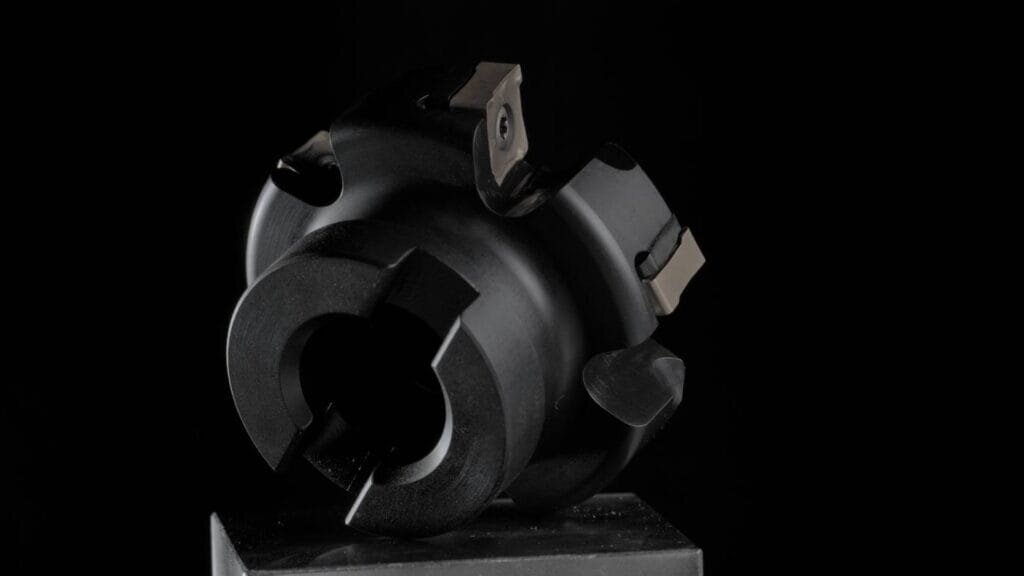
Machining tests
The performance advantages of CoroMill® MF80 have been demonstrated against competing tools. CoroMill® MF80 and a competitor’s shoulder mill were tested in a roughing application on an ISO-K cast iron workpiece, to produce carrier and support components.
Both tools were tested under the same working conditions, the same cutting parameters and the same cycle time. The CoroMill® MF80 measured 80 mm in diameter and had one insert less than competitor’s tool. The end result was that the tool life of one edge was increased by 54%, which means CoroMill® MF80 produced 15 components compared with 10 produced by the competing tool.
Next, CoroMill® MF80 was tested in a rough shoulder milling application on an ISO-P steel workpiece, to produce pump and valve components. In order to optimise the process, an 80 mm diameter CoroMill® MF80 cutter with higher insert density was used. A higher insert density spreads cutting forces across more edges, for reduced wear and improved machining performance. Additionally, it provides better stability and support for the tool, which leads to smoother cutting.
The competitor tool was run with five inserts, while the CoroMill® MF80 tool was used with eight inserts. This means that the CoroMill® MF80 tool could engage with the workpiece with more cutting edges simultaneously, allowing for faster and more efficient material removal. By utilising more available cutting edges, the CoroMill® MF80 could maximise the machine’s capacity and potential output, ensuring the machine operated at optimal efficiency.
The CoroMill® MF80 produced the part in just 2.8 minutes compared with a much longer 4.5 minutes with the competing tool, which improved the overall productivity by 60%. The tool life was improved by 67%, with 15 components being made with one edge set of CoroMill® MF80 versus nine components with the competing tool.
As a specialised solution, CoroMill® MF80 is meticulously designed for close-to-90-degree shoulder milling in ISO P and K applications, is poised to capture a significant share of the automotive milling market. Going forward, rather than diversifying the product line, Sandvik Coromant’s focus remains on perfecting and optimising this tool for its target niche.
By addressing industry challenges with innovation, CoroMill® MF80 offers unparalleled efficiency, reliability and cost-effectiveness.
For more information on Sandvik Coromant’s CoroMill® MF80 for secure face and shoulder milling, visit its website.

